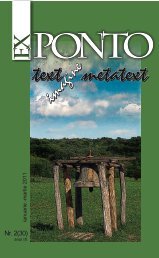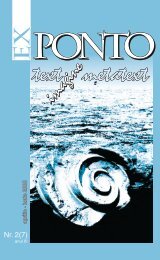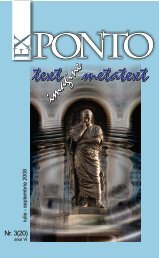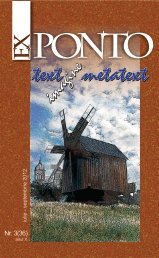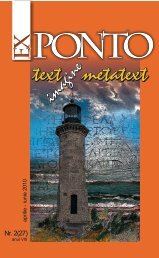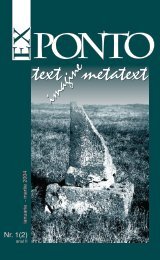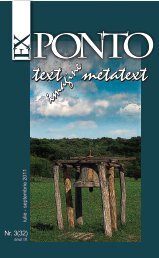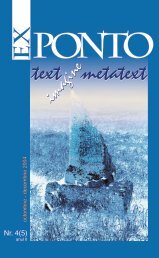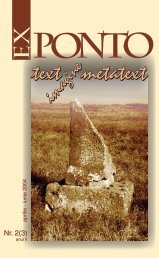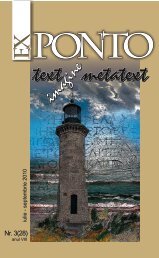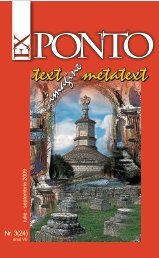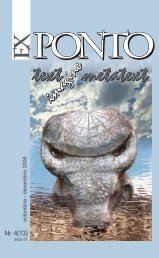Nr. 3 (12) anul IV / iulie-septembrie 2006 - ROMDIDAC
Nr. 3 (12) anul IV / iulie-septembrie 2006 - ROMDIDAC
Nr. 3 (12) anul IV / iulie-septembrie 2006 - ROMDIDAC
- No tags were found...
You also want an ePaper? Increase the reach of your titles
YUMPU automatically turns print PDFs into web optimized ePapers that Google loves.
via media, while bridging the gap between those two terrœ firmœ 15 . In sodoing, the ontological and epistemological status of their social world cannotbut appear as somewhat fuzzy, both for those who rely on manicheist dualismsand those denying commensurability when setting out to explain or understandsocial reality.ADRIANO MOREIRA: INTERLOCUTOR TO ARON AND MARITAINTaken as a whole, Adriano Moreira’s interpretivism is finalist andteleological, drawing all along on the transcendence of a grounding humanconscience – that sort of ontological and epistemological warrant manyintellectual quarters dismiss today as but a fictional subject. As a typicallymodern body of thought, Adriano Moreira’s theorization clearly adheres tothe need to warrant knowledge on secure grounds; to think otherwise wouldcertainly leave the world prey to ‘mis-understanding’. Either there are solidgrounds for the human project or un-reason shall take the place of reason,which in the formulation of Richard Bernstein means that “either there issome support for our being, a fixed foundation for our knowledge, or wecannot escape the forces of darkness that envelop us with madness, withintellectual and moral chaos” 16 . For sure, Adriano Moreira’s reluctance toproduce grand syntheses in the confrontation of traditions of thought hasnothing to do with postmodern skepticism. It draws instead on that sort ofChristian-existential humility pointing at the dramatic character of humannature and at the situatedness of reason which can be mitigated by the resortto an Archimedean point of ontological reference and epistemological security.This ground, I argue, conforms to a dialogical form of reason in which utopiastands for the ultimate warrant of the meaning of life and disenchantmentamends utopia’s excesses in order to assume the “combative, melancholicand ironic form of hope” 17 .As for Aron and Maritain, so too in Adriano Moreira’s theorization thetension between the Machiavellian and Humanist legacies becomes a crucialhermeneutic device in the production of knowledge about the normativestructures constituting the social world. In this respect, Adriano Moreira is thePortuguese interlocutor in the dialogue of Aron and Maritain on the disputeof Machiavellianism. He is the interpreter of this dispute, making it known tothe Portuguese public and transforming it into a central piece and catalystof his own thought. Publishing in France Libre, on 15 June 1943 under thepseudonym of René Avort, Aron would define the essential of the dispute byasking two questions: “[w.]hat goal the one purporting to govern his people issupposed to pursue?” and “[w.]hich are the means that, in conscience, he hasthe right to use?” 18 In Aron’s view, these questions have to be posed as longas men’s imperfection and opposing aspirations accord to force and injusticea central role in society. In his answer, Maritain tried to stay away from sheeridealism by underlining the nature of political choice as an inescapably dramaticactivity whose judgement does not depend entirely on the criteria of Christianethics. In fact, he accorded his agreement to Aron by acknowledging that“choosing the means for action is not always possible” 19 . The drama of politicsthus becomes that of an inevitable clash of ethical criteria for action, in a waythat often is it impossible to stay away from the dilemma of whether to lose thesoul or the city. Maritain’s answer clearly reflects the concern to understand thelimitations imposed on men by the circumstances, i.e. to take into account theEx Ponto nr.3, <strong>2006</strong>171




